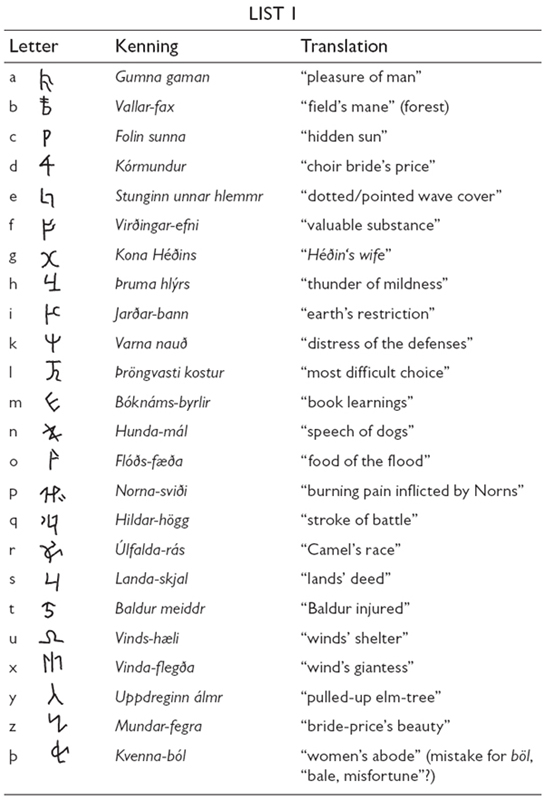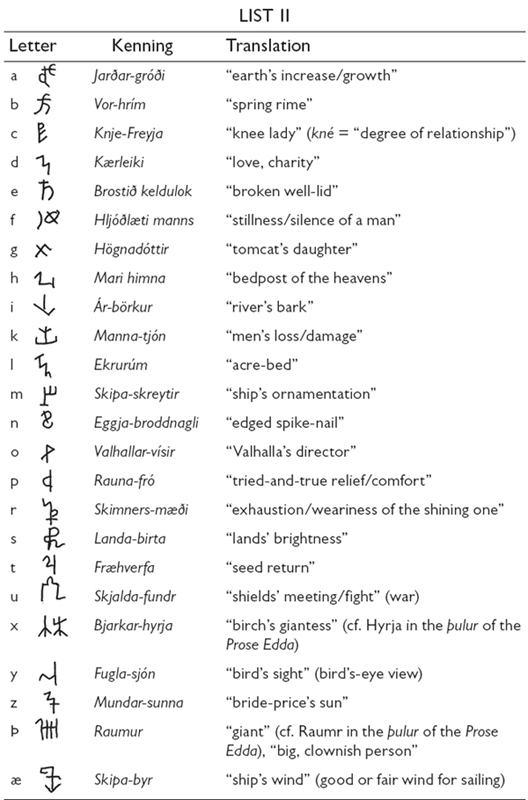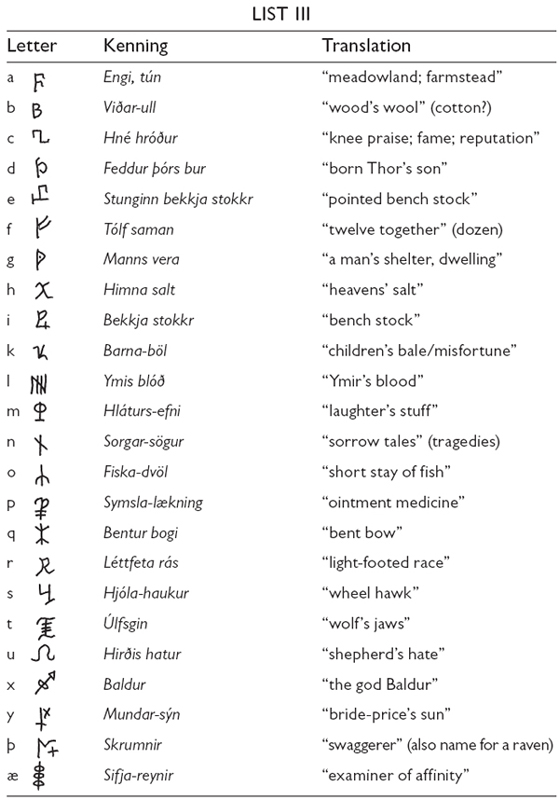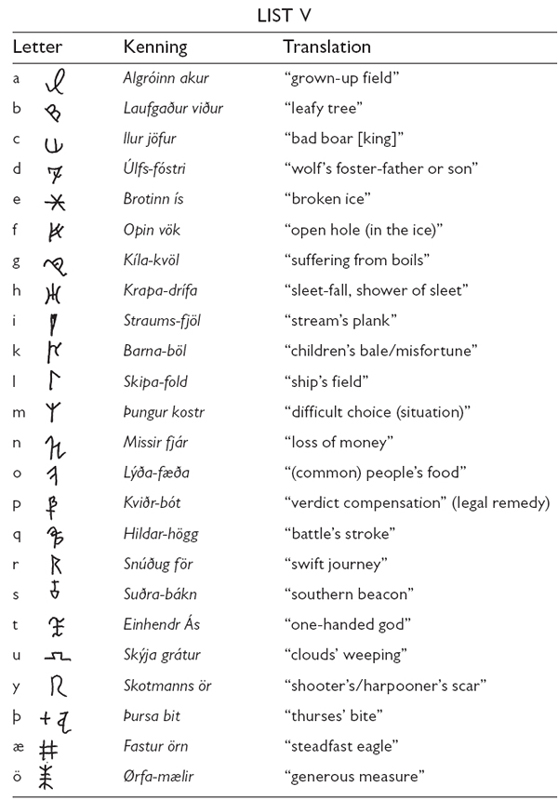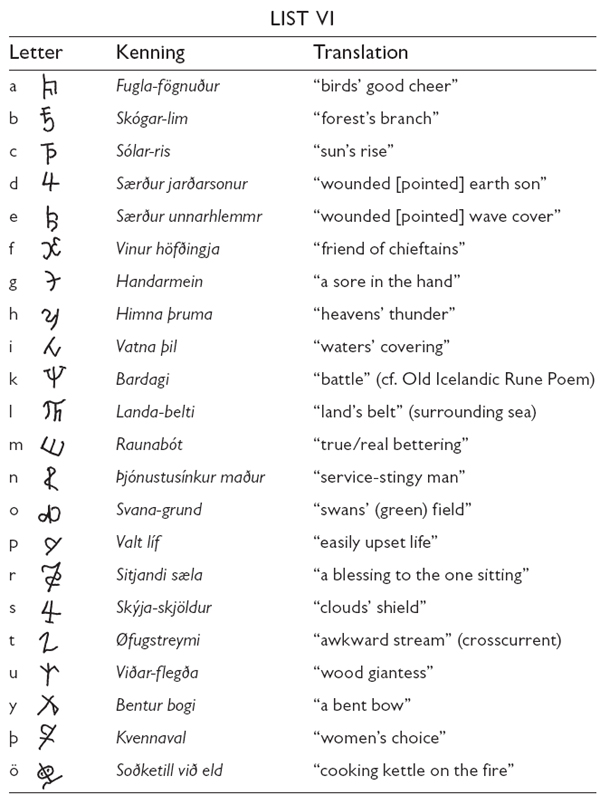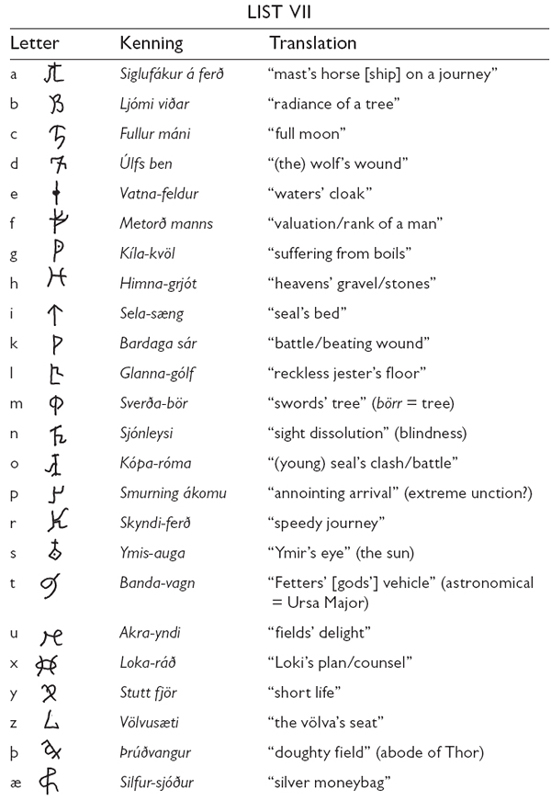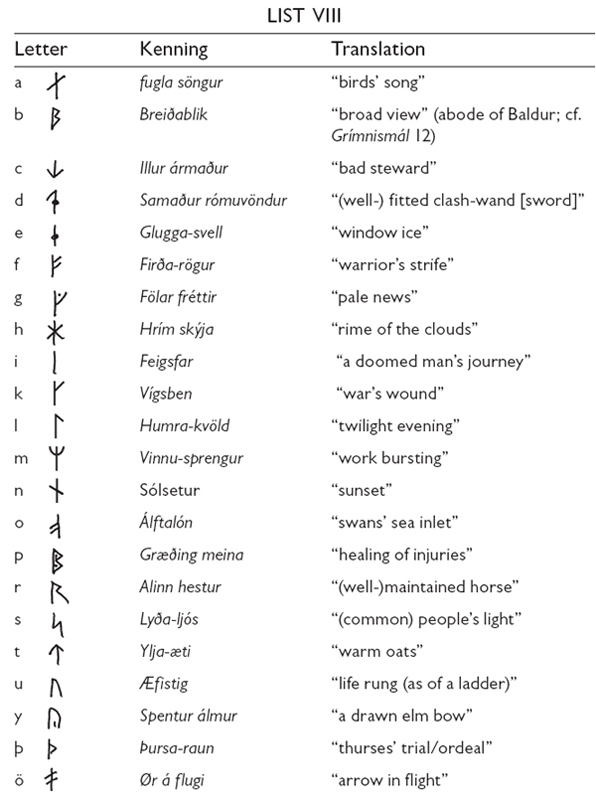Icelandic Magic (16 page)
APPENDIX B
Names of Ãðinn
Names of Ãðinn can be used for operative purposes. Each has a meaning that reveals its area of magical function. The names can be first turned into runic formulas and then used as the bases of
galdramyndir.
Suggested operative aims appear in parentheses. This is not a complete list of the names of Ãðinn, but it does contain the most magically useful ones.
Aldaföðr:
“Father of Men” [for workings affecting all of mankind]
Aldagautr:
“
Gautr
(Father) of Men” [for workings affecting all of mankind]
Alföðr:
“All-Father” [for workings affecting all of mankind]
Arnhöfði:
“Eagle Head,” mythically referring to the theft of
ÃðrÅrir,
the mead of poetry [for inspiration and stealth]
AtrÃðr:
“The One Who Rides to Battle” [for aggressive magic]
Auðun:
“Wealth Friend” [for wealth]
Báleygr:
“Fire Eye” [for insight beyond Midgard]
BÃldr:
“Knife for Bloodletting” [works of healing]
Björn:
“Bear” [to gain strength]
Blindr:
“Blind” [to gain inner vision]
Bölverkr:
“Bale (Evil) Worker” [to gain cunning and be deceptive for the purposes of gain]
Farmaguð:
“Cargo God” [for good business or to help the dead cross to the other side]
Farmatýr:
“Cargo God” (same as
Farmaguð
)
Fengr:
Either “Booty” (see also
Farmaguð, Farmatýr
) or “The One Who Catches,” referring to his collection of souls for Valhöll [for gaining riches, or for expression of loyalty to Ãðinn]
Fimbultýr:
“The Great God” (
fimbul
is a high-level intensifier of meaning) [for general personal power]
Fimbulþulr:
“The Great Magical Speaker” [for eloquence]
Fjallgeiguðr:
“The One Who Travels over Fells (mountains)” [for aid in navigating through life's difficulties]
Fjölnir:
“The Concealer” (from
fela,
perhaps referring to the mead of poetry) [for empowering any magical work through concealment]
Fjölsviðr:
“The One Who Knows Much” [for works of enlightenment]
Forni:
“The Old One” [for discovery of primeval wisdom]
Fornölvir:
“Ancient ÃlvirâHeathen Ãlvir” (the name Ãlvir may have originally meant “the very holy”) [for sanctification of a person or place]
FrárÃðr:
“Swift Rider” (this name may be related to Ãðinn's role as the riding god of death; see also
AtrÃðr
) [for sendings]
Fundinn:
“The Found One” [for works of discovery of unknown things]
Gagnráðr:
“The One Who Advises Against,” that is, “antagonist in an argument” [to win an argument or legal case]
Gangráðr:
“The One Who Knows the Way” [for seeking advice from a divine source on the directions one should take in life]
Gapþrosnir:
“The One Who Ripens Magical Signs” [for use in charging or loading signs]
Gautr:
“Gaut, Goth, Man from Gotland,” also the name of the tribal father of the Gothic folk; clearly Ãðinn's name as tribal patriarch [to strengthen bonds of identity with the noble ancestors]
Geiguðr:
“The One Swinging on the Gallows” [for works of personal transformation]
Geirlöðnir:
“The One Who Invites (to battle) with a Spear” [to express fearlessness]
Geirtýr:
“Spear God” [to learn the mysteries of the spear]
Ginnarr:
“Bewitcher, Deceiver, Sorcerer” are the usual definitions, but the name goes back to the original meaning: “He who Creates out of
Ginn
(the magically charged void)” [for any and all acts of creativity]
Gizurr:
Related to the Norse verb
geta,
denoting Ãðinn's ability to solve riddles [for solving problems]
Glapsviðr:
“Used to Luring” [for works of seduction]
Goðjaðarr:
“Protector of the Gods” [for preserving the gods in the world]
Göndlir:
“Wand Bearer” (from
göndull,
“magical staff, magic wand” or “male member”) [to seal processes of internal transformation]
GrÃmnir:
“The Masked” [for concealing your works, especially if they are aimed at enemies]
GrÃmr:
“The Masked” [for malevolent workings against enemies]
Gunnblindi:
“He Who Causes Blindness in Battle” [for causing confusion among your enemies]
Hagvirkr:
“Skillful Worker” [for focusing your skills]
Hangaguð:
“God of the Hanged” or “Hanged God” [for works of self-transformation]
Hangatýr:
“God of the Hanged” or “Hanged God” (same as
Hangaguð
)
Hangi:
“Hanged One” (same as
Hangaguð
)
Haptaguð:
“Fetter God” [can be used either to bind your enemies and make them helpless or to liberate yourself from inner fetters]
Haptsonir:
“Fetter Looser” [specifically for self-liberation from that which binds you, physically or magically]
Hárr:
“The High One” [to honor the High One]
Harr or Hárr:
“The One-Eyed,” perhaps also “Gray-Haired” [either for works of self-sacrifice for the sake of transformation or to declare an initiatory state of wisdom]
Herföðr:
“Host Father” [for organizing people to a common cause]
Herteitr:
“Host Glad” [to gather people to a common cause]
Her-Týr:
“Host God” [to make one's self a good organizer]
Hjálmberi:
“Helm Bearer” [for protection]
Hjarrandi:
“The Rattler” (this is a reference to the sound made by a raven) [for workings related to raven magic, that is, communication and intellectual synthesis]
Hnikarr:
“Instigator” [to set processes in motion]
Hrafnáss:
“Raven God” [for works in gaining wisdom]
Hrafnaguð:
“Raven God” [for works in gaining wisdom]
Hrani:
“The Rough One,” or “The Uncultivated” [for works in defiance of conventional restraints]
Hrjótr:
“The Roarer” [for works of ecstasy]
Hroptatýr:
“The Hidden God” [to know the unknown]
Hroptr:
“The Hidden One” [to know the unknown]
Hvatmóðr:
“Rash Courage” [for works of courage]
Itrekr:
“Excellent Ruler” [to govern, manage, or lead well]
Jafnhár:
“Just as High” [to declare an initiatory state of wisdom]
Jalfaðr, Jölfuðr:
“Yellow-Brown Bear” [for works of strength]
JárngrÃmr:
“Iron cruel” [to cause strife]
Jólnir:
“Leader of the Yule Beings (gods)” (Ãðinn is called Jólnir because he is particularly worshipped at Yule) [to be contemplated at the Yuletide]
Jörmunr:
“The Great One” [for especially great undertakings]
Njótr:
“Enjoyer, User” [to gain comfort and well-being]
Ãðinn:
“Master of Inspiration” [for all kinds of work]
Ãðr:
“Poetic Inspiration” [for gaining inspiration]
Ãfnir:
“Inciter” or “Combative Weaver” (used for a snake in
GrÃmnismál
34, probably referring to Ãðinn's metamorphosis into a snake) [for works of inner transformation intended to serve the greater community]
Ãmi:
“The Resonant Voiced,” or, more likely, “The Highest” [for acts of worship or praise of the divinity]
Ãski:
“Wished for” [for getting a wish fulfilled]
Rögnir:
“Divine One” or “Ruler of the
Regin
(gods)” [for acts of worship or praise of the divinity]
Sangetall:
“Obtaining the Truth” [for learning the truth]
Sannr/Saðr:
“The True One, the Sooth” [for learning the truth]
Sigfaðir or Sigföðr:
“Victory Father” [for obtaining victory or success]
Siggautr:
“Victory Gautr” [for obtaining victory or success]
Sigmundr:
“Victory Protection” [for protecting the fruits of victory]
Sigtryggr:
“Victory Trustee” [for success in all things, especially conflicts]
Sigtýr:
“Victory God” [for success in all things, especially conflicts]
Skollvaldr:
“Ruler of Treachery or Cunning” [to become cunning]
Sváfnir:
“Slayer or âPutter to Sleep,'” (the name of a snake in
GrÃmnismál
34) [for curses or to cause someone to lose awareness]
Sviðrir:
“The Enlightener” [for works of enlightenment]
Svipall:
“Swift Moving/Changeable” [for works causing sudden changes in events]
Unnr or Uðr:
possibly “The Beloved” or the god of fellowship, from
vÃnr
[to make oneself popular]
Vakr:
“Awake” [for works of awakening to higher consciousness]
Valföðr:
“Father of the Slain” [for works of necromancy, to gain knowledge from the dead; this is the use of most of the names beginning with the element
Val-
]
Valgautr:
“Gautr of the Slain” [to honor ancestors or for works of gaining knowledge from them]
Valkjósandi:
“Chooser of the Slain” [to help the dead pass the Rainbow Bridge happily]
Valtamr:
“Accustomed to the Slain” [to honor ancestors or for works of gaining knowledge from them]
Valtýr:
“God of the Slain” [to honor ancestors or for works of gaining knowledge from them]
Valþögnir:
“Receiver of the Slain” [to help the dead pass the Rainbow Bridge happily]
Vegtamr:
“Accustomed to the Road” [for works of transformation or travel]
Veratýr:
“God of Men” [for works to affect one's fellow men]
Viðrir:
“Weather Causer” [for weather magic]
Viðurr:
“Annihilator, Slayer” [for works of vengeance]
Vingnir:
“The Swinger/Striker/Turner” [to attack enemies]
VÃðfrægr:
“Wide Famed” [to make one's fame greater]
Vöfuðr:
“Hanger/Dangler” [for self-transformation]
Yggr:
“The Terrible” [to persevere through hard times toward transformation]
Ãekkr:
“Comfortable, Beloved” [to gain a good spouse]
Ãrasarr:
“The Quarreler, the Angry” [to cause fear in enemies]
Ãrór:
“The Successful” [for success in all things]
Ãróttr:
“Strength” [for strength]
APPENDIX C
Magical Letters and Rune Kennings
Here are eight lists of magical letters. Each letter has a phonetic value linked to the adapted Roman alphabet used to write the Scandinavian languages in the Middle Ages. These are magical letter substitutes for those ordinary letters. Each of them was also given a kenning, or special interpretive phrase, that said something about the meaning or symbolic value of the letter. These kennings are usually linked to the lore of the runes used in the ancient North. The letters can be used to write magical missivesâcorrespondence addressed to the powers of magic to gain certain effects. Such characters can also be used to conceal the meaning of texts, or specific words or passages in them, from the eyes of the uninitiated. Most important, however, they can be used as secret encodings in the constructions of magical signs. Magical signs can be created from their forms, just as runes are used. They can also be used as flourishes in such signs. I invite you to discover their mysteries, whosoever can.
